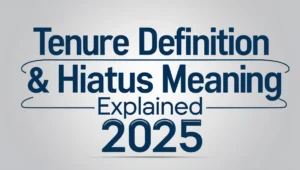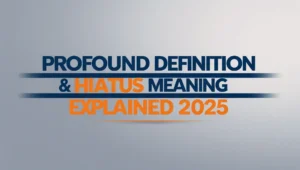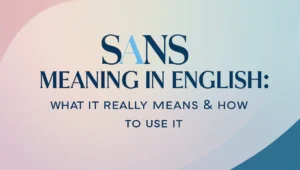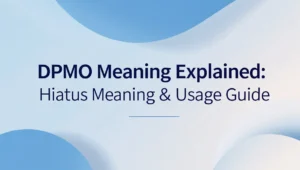In today’s fast-evolving professional and academic landscapes, two terms have gained renewed significance: Tenure and Hiatus. As we move into 2025, understanding the tenure definition and hiatus meaning has become essential for students, employees, employers, and educators alike. These aren’t just abstract concepts—they directly influence how we view career growth, job stability, and mental well-being. Whether you’re chasing a long-term position or contemplating a pause in your journey, this guide will help you grasp both ideas clearly and confidently.
Tenure Definition 2025: What Does Tenure Mean Today?
Tenure refers to a permanent or long-term position, usually granted after a trial or probation period. The term is most often used in academic settings, where professors are offered tenure as a reward for their dedication and expertise. However, in 2025, the concept of tenure has extended far beyond universities.
Today, the tenure definition in 2025 represents:
- Job Security: Once tenured, individuals cannot be removed from their position without just cause.
- Professional Recognition: Tenure is often seen as a milestone that signifies expertise, trust, and long-term value to an organization.
- Freedom of Expression: In educational and research environments, tenure protects employees’ rights to explore ideas without fear of retaliation.
Unlike previous years, where tenure was rigid and mostly academic, companies are now adopting similar structures. Some organizations offer “corporate tenure” as a way to retain top talent—essentially giving employees more decision-making power and long-term job security after a certain period of contribution.
In short, tenure in 2025 isn’t just about holding a position—it’s about being acknowledged for your consistent value and being entrusted with long-term responsibilities.
Hiatus Meaning 2025: What Does a Hiatus Really Mean?
A hiatus is defined as a temporary break or interruption in an ongoing activity, process, or career. The term has become increasingly popular in both professional and personal contexts. In 2025, the hiatus meaning carries a much more positive and empowering tone than it did in the past.
Here’s what a hiatus often looks like today:
- Career Hiatus: Taking time off work for personal development, travel, caregiving, or health recovery.
- Academic Hiatus: Students pausing their studies to gain life experience or manage personal challenges.
- Creative Hiatus: Artists and creators stepping back to recharge, reflect, or pivot creatively.
In the modern world, a hiatus is no longer viewed as a career gap—it’s seen as a strategic reset. Many professionals use hiatuses to prevent burnout, rediscover their goals, and return stronger and more focused. Employers in 2025 are increasingly supportive, even offering structured leave programs for mental wellness and personal development.
Choosing a hiatus is not quitting; it’s choosing to pause with purpose.
Tenure vs Hiatus: How They Differ and Why Both Matter in 2025
Though tenure and hiatus may seem like opposites, they both serve important roles in shaping modern careers. One provides permanence and protection, while the other allows pause and perspective.
Let’s compare their core differences without using a table:
- Tenure is about long-term commitment, while a hiatus is about short-term withdrawal.
- Tenure is often granted as a reward for consistent performance, while a hiatus is self-initiated to support personal or professional needs.
- Tenure is mostly associated with academic or institutional settings, but is spreading into the corporate world. Hiatus is commonly found across all professions, especially those focused on mental health, creativity, and well-being.
- Tenure promotes stability, whereas a hiatus encourages renewal and growth.
Understanding both gives you a fuller view of how to manage your career in 2025—whether you’re seeking lasting commitment or a temporary breather.
Why Tenure and Hiatus Are Especially Important in 2025
Workplace culture in 2025 is different from even five years ago. The rise of remote work, gig jobs, and flexible schedules has transformed how we think about career success. Here’s why both tenure and hiatus are trending terms in this era:
- Burnout is Real: More people are recognizing the need to step back. A hiatus offers a healthy way to cope without giving up entirely.
- Loyalty is Earned: Companies are offering tenure-style benefits to reward dedication and retain top talent.
- Mental Health Awareness: Breaks and rest are now part of performance strategies, not signs of weakness.
- Non-linear Careers: People switch paths, take sabbaticals, and return to work multiple times—tenure and hiatus both reflect this shift.
Employers, educators, and individuals who understand and respect these concepts are better positioned for sustainable success.
Unique FAQs About Tenure and Hiatus in 2025
1. Can I take a hiatus and still return to the same job? Yes, in many cases. Some companies offer structured hiatus or sabbatical programs where your job is held for you while you’re away.
2. Is tenure only available in teaching or education? Not anymore. While tenure started in academia, it is now being adopted in healthcare, research institutions, and even private companies.
3. How long should a career hiatus be? There’s no fixed length. Some people take a few weeks; others take a year. The key is to plan your return and keep communication open with your employer or network.
4. Does tenure mean I can’t be fired? Not exactly. Tenure provides job security, but it doesn’t make you immune to consequences. You can still be dismissed for serious misconduct or performance issues.
5. How should I explain a hiatus in an interview? Be honest and confident. Focus on what you gained during the hiatus—personal growth, new skills, or clarity about your goals. In 2025, employers value transparency and intentionality.
Conclusion
In 2025, tenure and hiatus are no longer old-fashioned terms—they’re essential parts of modern professional life. Tenure offers the promise of stability, respect, and career longevity. Hiatus gives space for rest, reflection, and intentional redirection. Both paths are powerful in their own right, and both are more accessible and acceptable than ever before.
Whether you’re striving for long-term recognition through tenure or seeking to recharge through a planned hiatus, understanding these concepts can help you shape a career that aligns with your values, pace, and potential.
Remember, your career doesn’t have to follow a straight line—it just needs to move in the direction that’s right for you.
















